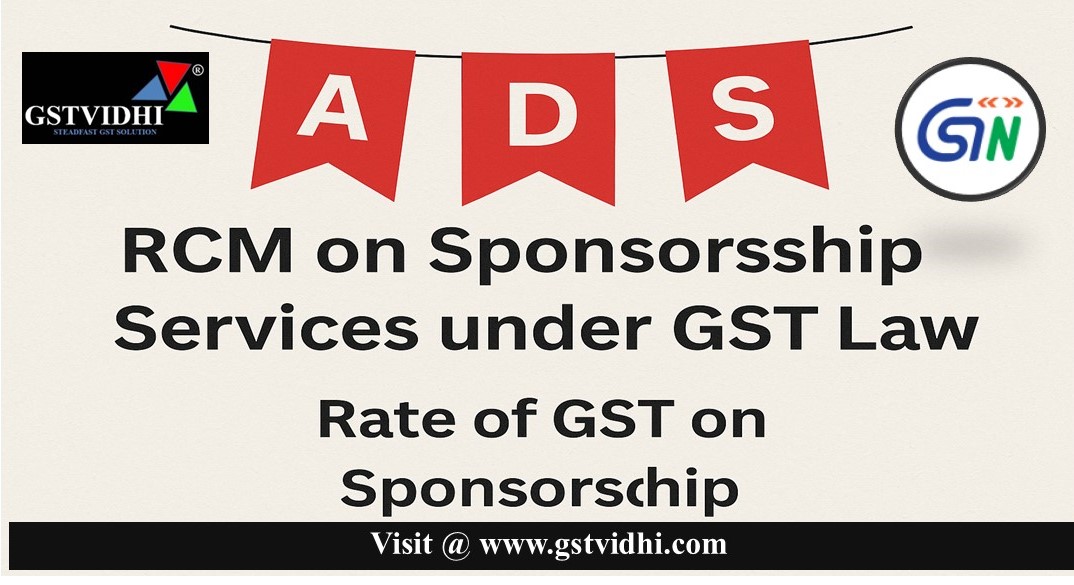
What is Sponsorship? / RCM on Sponsorship Services under GST Law / Rate
of GST on Sponsorship
What is
Sponsorship?
Sponsorship is a kind of advertising
or promotion, where a company or person pays to have their name, logo,
or brand associated with an event, competition, or activity. This is different
from a donation because in sponsorship, something is expected in return,
like visibility or promotion.
Sponsorship
may include:
- Naming an event after the sponsor
- Displaying the sponsor’s company
logo or trade name
- Giving the sponsor exclusive
booking rights
- Letting the sponsor give prizes or
trophies
What is not
Sponsorship?
If someone gives donation
or gift with no expectation of return, it is not considered
sponsorship. For example, if a company donates ₹1 lakh to a school without
asking the school to display their banner or logo, it is a donation, not
a sponsorship.
How is
Sponsorship an Alternate Form of Advertisement?
Sponsorship is like indirect
advertising. Instead of directly showing ads on TV or newspapers,
businesses sponsor events to promote their name. For example:
A sports drink brand
sponsors a football match. In return, their brand is printed on the players’
jerseys and banners are placed all over the stadium.
In such cases, the event
organiser is providing a service to the sponsor – i.e., the service of
promotion and visibility.
GST
Implications on Sponsorship
Under the GST law,
sponsorship is treated as a supply of service, and tax is applicable.
Let’s break down the
rules in a simple way.
Reverse
Charge Mechanism (RCM) in Sponsorship
Usually, under GST, the supplier
of service pays the tax. But in some cases, the recipient has to pay the
tax instead. This is known as the Reverse Charge Mechanism (RCM).
According to GST
Notification:
Under Notification No.
13/2017-Central Tax (Rate), if a sponsorship service is provided to:
- A body corporate (e.g.,
private limited company, public company), or
- A partnership firm (including
LLPs),
then GST is payable under reverse charge by the recipient.
Summary of the Rule:
|
S.
No.
|
Type
of Service
|
Supplier
of Service
|
Recipient
|
Who
Pays GST?
|
|
4
|
Sponsorship
|
Any
Person
|
Body
Corporate or Partnership Firm
|
Recipient
(under RCM)
|
Rate of GST
on Sponsorship:
Sponsorship services are
generally taxed at 18% GST (9% CGST + 9% SGST or 18% IGST, depending on
the nature of supply).
Special Exemption for
Certain Sports Sponsorships
Not all sponsorships are
taxable under GST. Some specific sponsorships related to sports are exempt
from GST.
As per Notification No.
12/2017-Central Tax (Rate):
Sponsorship of certain
sporting events is exempt from GST if they are:
1. Organised
by a National Sports Federation or affiliated bodies, where teams or
individuals represent a district, state, zone, or country.
2. Conducted
by organisations like:
o Association
of Indian Universities
o Inter-University
Sports Board
o School
Games Federation of India
o All
India Sports Council for the Deaf
o Paralympic
Committee of India
o Special
Olympics Bharat
o Indian
Olympic Association (as part of National Games)
3. Events
under Panchayat Yuva Kreeda Aur Khel Abhiyaan Scheme (PYKKA)
In these cases, GST is
0%, i.e., no GST payable.
Examples
for Better Understanding
Example 1: Sponsorship
under RCM
ABC Pvt Ltd
sponsors a business conference organised by a trust. In return, the company’s
name is displayed in banners and brochures.
- Supplier of Service:
The trust (organiser)
- Recipient of Service:
ABC Pvt Ltd (a body corporate)
- Tax Treatment:
GST is applicable @18% under Reverse Charge Mechanism
- Who Pays?
ABC Pvt Ltd will pay the GST directly to the government.
Conclusion
Sponsorship is a common
way for businesses to promote their brand, and under GST, it is treated as a
taxable service. The government ensures tax is paid either by the organiser
or by the recipient under reverse charge mechanism.
However, sponsorship of specific
sports events is exempt, to encourage sports development. It’s
important to understand the nature of sponsorship and the type of recipient to
know the correct tax treatment.
Disclaimer: All
the Information is based on the notification, circular and order issued by the
Govt. authority and judgement delivered by the court or the authority
information is strictly for educational purposes and on the basis of our
best understanding of laws & not binding on anyone.
Click here